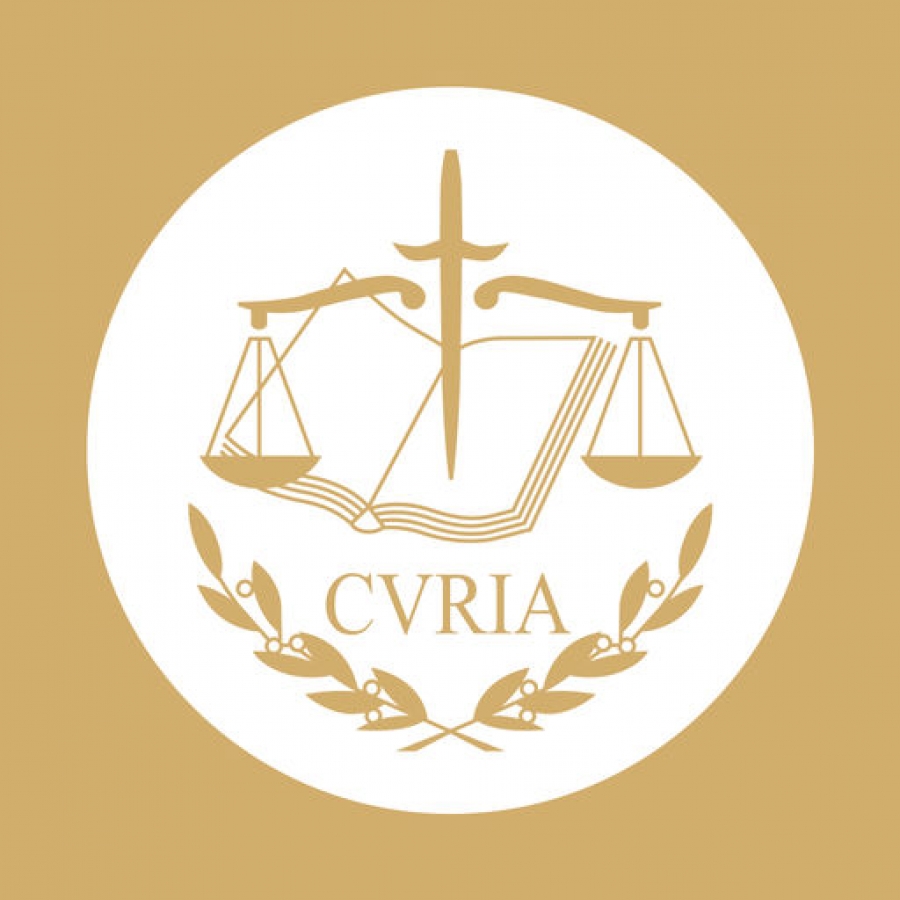Tuesday 12th June 2018
Judgment in Case C-163/16 Louboutin and Christian Louboutin
(Trade mark – notion of ‘shape’ – coloured sole)
In this case, the Rechtbank Den Haag (District Court, the Hague) asks the Court of Justice for clarification of the notion of ‘shape’ for three-dimensional products under the Trade Marks Directive (2008/95/EC). Specifically, the Court is asked whether ‘shape’ is limited to the three-dimensional properties of the goods, such as their contours, measurements and volumes, or does it include other (non-three dimensional) properties of the goods, such as their colour.
The French designer, Louboutin, had a Benelux trade mark for the specific bright-red colour used on the entire surface of the outsole of the shoes that he designs. The description of the mark was that the colour red applied to the sole of a shoe as reproduced (the shape of the shoe does not form part of the mark but is intended to demonstrate the positioning of the mark).

In 2012, Van Haren, a retail shoe shop operated in the Netherlands, launched the sale of its “Fifth Avenue by Halle Berry” line of women’s high-heel shoes with a bright-red outsole. Louboutin claimed this shoe infringed its trade mark.
In April 2013, the District Court of The Hague awarded Louboutin a preliminary injunction against Van Haren. That court considered that the red sole had not been used solely for decorative purposes but the mark was used in a consistent and sustainable way and the public therefore identified the red sole mark with a certain designer (Louboutin).
Van Haren appealed this decision, arguing that the mark should not have been registered since signs consisting exclusively of the shape which gives substantial value to the goods cannot be registered as a mark under Directive 2008/95. It is in this context that the Dutch Court asks for clarification on the notion of ‘shape’ under the directive.
On 6 February 2018, Advocate General Szpunar gave his Opinion in the case, following reassignment of the case to the Grand Chamber. He considered that the prohibition on trademarks consisting exclusively of ‘the shape which gives substantial value to the goods’ may also apply to a sign combining shape and colour. The reputation of the mark or its proprietor cannot be taken into account when determining whether the shape gives substantial value to the goods.
There will be a press release for this case.
Background Documents Case C-163/16
Wednesday 13th June 2018
Hearing in Case C-432/17 O’Brien
(Part-time work – pensions – temporal effects of EU legislation)
Between 1978 and 2005, Mr O’Brien worked as a self-employed barrister and, part-time as a judge of the Crown Court. He was paid a daily fee for his work as a judge. During that time, national law entitled salaried judges (including part-time judges) to a pension based on number of years’ service, but expressly did not apply to fee-paid part-time judges.
Mr O’Brien argued that such a distinction was contrary to the EU Directive on the Prevention of Less Favourable Treatment for Part-Time Workers, which was implemented in UK law in 2000. The UK Supreme Court asked the Court of Justice whether the national provisions were compatible with the directive and the Court of Justice held that they were not. The Supreme Court therefore found that Mr O’Brien was entitled to a pension on terms equivalent to a comparable full-time judge.
The question that has now arisen is whether, in calculating the amount of his pension, account should be taken of the whole of his service since the beginning of his appointment in 1978 (a period of 27 years), or only his service since 7 April 2000, the deadline for transposing the directive (a period of less than 5 years). The UK Supreme Court asks the Court of Justice to clarify the temporal applicability of the directive.
Thursday 14th June 2018
Judgment in Case C-458/17 P Rami Makhlouf v Council
(Restrictive measures – Syria – Cousin of Bashar al-Assad)
Since 2011, Mr Rami Maklouf, a business man operating in Syria, has been subject to restrictive measures adopted against Syria. The measures prevent Mr Maklouf from entering or transiting through the territory on the European Union and freeze his economic funds.
The restrictive measures were imposed on the following grounds: “Leading business man operating in Syria with interests in the telecommunications, financial services, transport and property sectors; he has financial interest in and/or holds senior and executive positions in Syriatel, the leading mobile telephone operator in Syria, the investment funds Al Mashreq, Bena Properties and Cham Holding. He furnishes financing and support to the Syrian regime, through his business interests. He is an influential member of the Makhlouf family and closely connected to the Assad family; cousin of President Bashar al-Assad.”
Mr Makhlouf applied to the General Court to annul the continued imposition of those restrictive measures for the period from 29 May 2016 to 31 May 2017. On 18 May 2017 the General Court confirmed the measures imposed upon Mr Makhlouf (see Press Release 55/17). Mr Makhlouf has brought an appeal against that judgment before the Court of Justice.
There will be a press release for this case.
Background Documents Case C-458/17
Thursday 14th June 2018 14h30
Hearing in Case C-220/18 PPU Generalstaatsanwaltschaft
(European arrest warrant – prison conditions – examination by executing authorities)
In the cases Aranyosi and Căldăraru, the Court of Justice ruled, following a request from the Hanseatisches Oberlandesgericht in Bremen (Higher Regional Court of Bremen, Germany), that the execution of a European arrest warrant must be deferred if there is a real risk of inhuman or degrading treatment because of the conditions of detention of the person concerned in the Member State where the warrant was issued (see Press Release 26/16).
In this case, the Hanseatisches Oberlandesgericht now asks the Court of Justice for further clarification concerning the examination of detention conditions in the issuing Member State (here, Hungary). The German court asks whether the mere fact that legal remedies exist for detainees in the issuing Member State in respect of the conditions of their detention rules out the risk of inhuman and degrading treatment and therefore makes the examination of the specific conditions of detention unnecessary.
If the answer to that question is no, the German court asks whether the examination should cover all possible prisons and what conditions of detention should be taken into account for the assessment. It also asks whether an examination of each individual detention facility could be dispensed with by the fact that the issuing Member State has the general assurance that the person concerned will not be exposed to any danger of inhumane treatment.
The requested person in this case is currently in detention and for that reason this preliminary reference is subject to the Court of Justice’s urgent procedure (PPU).
Tuesday 19th June 2018
Judgment in Case C-15/16 Baumeister
(Financial markets supervisory authority – access to documents – concepts of ‘professional secrecy’ and ‘confidential information’)
Mr Baumeister is one of the investors who suffered loss as a result of fraudulent conduct by the company Phoenix Kapitaldienst GmbH. In 2005, insolvency proceedings were commenced against Phoenix after it emerged that its funding model was based on a fraudulent Ponzi scheme.
Mr Baumeister made a request to the Bundesanstalt für Finanzdienstleistungsaufsicht (Federal Office for the Supervision of Financial Services, ‘the BaFin’) for access to certain documents concerning Phoenix, namely the special audit report, reports prepared by auditors, internal documents and reports and correspondence received or drawn up by BaFin in the context of its monitoring of that company. The BaFin denied that request on the basis that the documents were protected from disclosure under the Markets in Financial Instruments Directive (MiFID). Mr Baumeister challenged that decision before the German courts.
The Bundesverwaltungsgericht (Federal Administrative Court, Germany) now asks the Court of Justice to clarify the scope of the obligation of professional secrecy which is imposed on national financial markets supervisory authorities by MiFID. It also asks the Court of Justice whether, in order for business information communicated by the supervisory authority to be classified as ‘confidential information’ within the meaning of the Directive, and therefore benefit from protection, the relevant factor is solely the date of communication to the supervisory authority.
There will be a press release for this case.
Tuesday 19th June 2018
Opinion in Case C-193/17 Cresco Investigation
(Discrimination – religion – holiday pay)
In Austria, Good Friday is a paid holiday solely for members of specific churches. If members of those churches do work on that day then they are entitled to receive an additional payment. Mr Achatzi, who worked for Cresco Investigation (a private detective agency), does not belong to any of the specified churches and therefore did not receive additional holiday pay for working on Good Friday. He considers that the provision in Austria law constitutes discrimination on the grounds of religion.
The Oberster Gerichtshof (Supreme Court, Austria) asks the Court of Justice whether the Austrian law is compatible with the Equality Directive (Directive 2000/78) and the EU Charter of Fundamental Rights. If the provision is incompatible with EU law, the Austria court asks whether the provision of Austrian law should be disapplied, or whether a private employer is required to grant the same rights and entitlements to all of its employees, regardless of their religious affiliation.
Background Documents Case C-193/17
Tuesday 19th June 2018
Hearing in Case C-497/17 Oeuvre d’assistance aux betes d’abattoirs
(Halal meat – organic certification – compatibility with high standards of animal welfare)
The Administrative Court of Appeal of Versailles asks the Court of Justice whether the EU Regulations on organic production and labelling of organic products and the protection of animals at the time of killing must be interpreted as permitting or prohibiting approval of the use of the European label ‘organic farming’ in relation to products derived from animals which have been slaughtered in accordance with religious rites, without first having been stunned. The French court asks whether this is the case even where unstunned slaughter takes place in accordance with the requirements of the Regulation on the protection of animals at the time of killing.
The case has come before the Court of Justice following a challenge by the Oeuvre d’assistance aux betes d’abattoirs (Society for the Welfare of Slaughter Animals - OABA) to Ecocert’s (the organic certification body) decision to grant Bionoor organic certification for its halal meats. The OABA argues that the fact the animals are not stunned prior to slaughter means that the requirement of high standards of animal welfare is not satisfied.
Thursday 21st June 2018
Judgment in Case C-577/15 Commission v Malta
(Conservation of wild birds – derogations–infringement action)
An EU Directive sets out rules for the conservation of wild birds (Directive 2009/147/EC). The directive obliges Member States to prohibit the capture and keeping of wild birds not included in Annex II to that directive. The prohibition covers several species of wild finches. Any derogation from these prohibitions is subject to strict conditions.
Malta introduced a derogation regime for the authorisation of trapping seven species of wild finches in 2014 under which it authorised trapping seasons in 2014 and 2015. The Commission considers that Malta’s derogation regime is inconsistent with the Directive and Malta has failed to fulfil its obligations under EU law. The Commission has brought infringement proceedings against Malta.
There will be a press release for this case.
Thursday 21st June 2018
Hearing in Cases T-755/15 Luxembourg v Commission and T-759/15 Fiat Chrysler Finance Europe
(State aid – tax rulings – action for annulment)
In October 2015, the European Commission decided that a tax ruling issued by Luxembourg in 2012 gave a selective tax advantage to Fiat Finance and Trade, which unduly reduced its tax burden since 2012 by €20 - €30 million.
EU state aid rules require incompatible state aid to be recovered in order to reduce the distortion of competition created by the aid. Luxembourg was therefore ordered to recover the state aid in accordance with methodology established in the Commission decision (see also Commission Press Release IP/15/5880).
Luxembourg and Fiat seek the annulment of this decision before the General Court.
Thursday 21st June 2018
Opinion in Cases C-391/16 M, C-77/17 X and C-78/17 X
(Revocation of refugee status – conviction for serious offence – Charter of Fundamental Rights)
In these cases, three asylum seekers have challenged the decisions of the Czech and Belgium authorities to either refuse to grant them refugee status or subsidiary protection, or to revoke refugee status. The national authorities took those decisions on the basis that all three individuals had committed, and been convicted of, particularly serious offences in those countries.
The Qualification Directive harmonises the criteria by which Member States define who qualifies as a refugee, as well as other forms of protection for persons who face serious risks in their country of origin (subsidiary protection). The directive also provides that Member States may revoke, end or refuse to renew the status granted to a refugee when: (a) there are reasonable grounds for regarding him or her as a danger to the security of the Member State in which he or she is present; (b) he or she, having been convicted by a final judgment of a particularly serious crime, constitutes a danger to the community of that Member State. In those circumstances, the directive also allows Member States to decide not to grant status to a refugee.
The Czech and Belgium national courts ask the Court of Justice whether those provisions of the directive are compatible with international law, specifically the Geneva Convention, and the right to asylum enshrined under the EU Charter of Fundamental Rights.
There will be a press release for these cases.
Zdroj: CVRIA





